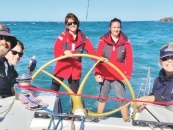Southeast Queensland boasts some of the best game fishing waters in the world. Experienced game fishers have a multitude of fishing tournaments run at different times throughout the region to take advantage of the various fishing sessions.
The billfish are accessible all year round, and a myriad of other game fish species are teeming in local waters, making the tournaments of the Gold Coast and Moreton Bay region some of the most exciting in Australia.
Fishing Tournaments: Tips and Tricks
Tournaments take recreational angling to the next level by making target fishing serious. The competition is fierce because the prizes and the honours are very attractive. All participants, no matter the size of boat, stand a chance to win.
There are many sanctioned tournaments held along the Australian coastline, which are all good fun and a great way to meet fishing comrades. There are some tricky regulations you need to abide by. An example is not being allowed to help the angler during the fight, making it very funny to watch your mate struggle on a big once-in-a-lifetime fish and you cannot help him or her. It is also illegal to gaff some species; only a net is allowed. Having the right line class and leader are some of the trickier rules to remember.
Make sure you are familiar with the rules specific to the tournament. For example, a 10kg tackle tournament means the line class of 10kg or under, and they are very strict with these rules. If your crew are not concentrating, they can make a mistake that ends the team’s chances. Missing the tag before a marlin breaks free, by illegally using a net to land the fish or by striking the drag with either too much or not enough drag can be disastrous. And make sure your boat is correctly registered and insurance has been paid; otherwise, you will be disqualified.
Before you go out fishing in a tournament you need to be prepared. Anglers need to undertake research prior to competition days, especially if they are in unfamiliar territories. An in-depth understanding of locations, weather, types of fish species, and baits are needed. Readily available equipment is important, such as a good sounder that you are familiar with, will give you an edge. However, to their credit, some teams do still venture out without one.
Rods, reels, line class, gaffs, nets, and extra tackle need to be arranged before the competition begins. Champion teams are very well organised. Safety is paramount too; make sure your boat and crew are ready for action in any conditions. Check safety equipment, lifejackets, and supplies for long days, and possibly over night. There is nothing worse than leaving vital items at home and realizing it when you are miles away from land.
Most competitors go fishing regularly, so there is no need to practice for a tournament. When fishing foreign waters, try to talk to the locals and use some of their techniques and knowledge. I was recently given local tips and baiting techniques, which helped me immensely. If you’re serious about competitive fishing, on the day you need to put into practice all the strategies and knowhow for the target fish. Be prepared that sometimes you will do everything right and still have no luck. My personal strategy in these tournaments is to firstly have a good social time, while using my best abilities to catch the target fish. If I am unsuccessful, then I am left to appreciate a good day on the water.
These days technology is a huge benefit, such as advance knowledge of fish finders, water temp apps, and websites that keep you updated on weather and fish migrations. Using the latest tackle improves your chances, such as tuna tubes, downriggers, outriggers, and tow-cams. There are no guarantees though. Too often, you have the latest equipment and techniques on board and never catch a fish, while a nearby boat with the basic limited equipment catch all the fish.
My fishing lifestyle
I am grateful to be living a sport fishing lifestyle where every tournament and event has left its mark on me. I regularly participate in competitive fishing. I have had the privilege to compete in several countries and all over Australia – Cairns, Exmouth, Perth, Darwin and Tasmania – and I have loved every minute of it and met the best people.
To-date, I have competed in many local tournaments against serious competitors. I love it! The Flathead Classic on the Gold Coast, Shimano Shootout, Garmin Light Tackle Masters, and several blue and black marlin, light and heavy tackle tournaments run by most game fish clubs up and down the east coast of Queensland. As the game fish migrate, other states run just as good tournaments at different times of the year, so it is a great excuse to travel while doing what you love.
Fishing is a great sport, with many ups and downs. Most important is to have fun during a tournament. It is my belief that if you keep trying, sooner or later you will have a win. I recommend you enter a tournament as a way of meeting other people who share a common passion, having fun while putting yourself in the running to catch a fish-of-a-lifetime, and maybe take a tournament win.
Keep in mind, there are serious teams out there who want to win all the time, and they can. But you and your mates can be right beside those teams, trying to catch the same fish with your smaller boat and far less experience, and still have the time of your life. And if you are like me, then you can enjoy seeing the fish caught by all boats and experiencing the spectacle of the whole show, before heading to the bar to share those stories of the big one that got away.
Locally sanctioned clubs are governed by the Game Fishing Association of Australia (GFAA), which is the longest established national fishing association in the world. It has been, and remains, a model and example for game fishing associations around the world. As such, the GFAA is affiliated with the International Game Fish Association (lGFA) and plays an active part in the leadership of the sport of game fishing on a world level. The GFAA code of practice is extensive, covering fishing ethics, conservation, education, safety and competition rules. www.gfaa.asn.au
By Vlad Tesic
Interview by Andy Kancachian
——————
Why join a fishing club?
The best way to learn how to compete in a tournament is to join a game fishing club. There are two clubs on the Gold Coast. Gold Coast Game Fishing Club and the Surfers Paradise Sports and Game Fishing Club. Further north, Moreton Bay Game Fish Club and The Little Ship Game Fish Club (also a club in Redcliff and Bribie Island). At these clubs, you will find out how to set up your boat and receive advice on rods and tackle. Members are an excellent source of information on where and what is biting. The clubs’ network provides an opportunity for you to fish on other members’ boats and learn from other crew on board.
A club will teach how to fish or how to fine-tune your fishing skills. The members meet regularly for social activities and to hear from guest speakers and club members who are willing to share their knowledge and experience. The clubs promote sustainable fishing through conservation and education. Many support and participate in ongoing tag-and-release programs. They encourage the study of game fishing species and their habitats, and assist in the maintenance of the marine ecological balance.






























